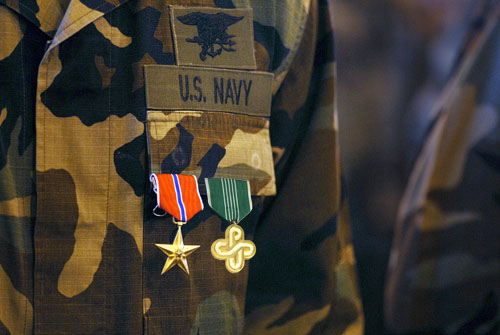
Back in the 1940s, before Portland State was a recognized four-year university, the Vanport Extension Center was founded as an avenue for World War II veterans to get a college education. PSU’s evolution to Oregon’s largest state university was built on serving a community’s needs.
Now, PSU is getting ready to launch its latest effort in offering educational services to student veterans: the Veteran’s Resource Center. With more than 1,000 veterans enrolled at PSU, and even more expected with the looming international military withdrawals, the VRC’s goal is to make the transition from a military environment to an academic one as easy as possible.
Set to open this fall, the VRC will offer new academic workshops to help veterans map their academic careers and to assist student veterans who need help choosing their major and potential career. The center will complement the variety of services for student veterans that PSU already offers, including Viking Vets, Veteran Services and VetSuccess.
Student veterans face a wide array of obstacles that the rest of us can only imagine. Alienation, depression, post-traumatic stress disorder and physical injuries are just a few of the hurdles these student veterans must overcome as they navigate their academic career.
Despite these hindrances, student veterans add a depth to PSU that would otherwise be lacking. As Michele Toppe, PSU’s dean of student life, said in a press release, “The wealth of experience and skills they bring makes our campus a better, more diverse, aware and civil place.”
While the university is doing its best to aid our student veterans socially, academically and professionally, we have to question whether the U.S. government is doing enough for our returning soldiers. Statistics and widespread opinions paint a pretty bleak picture.
This past winter the Department of Veterans Affairs released the results of a 10-year investigation into veteran suicide. What the DVA found is sobering: An American veteran commits suicide every 65 minutes. This equates to about 22 veterans taking their own lives every single day. Of these, 31 percent are veterans 49 years old or younger.
Even these statistics are likely an underestimation, as suicide isn’t always listed as the cause of death due to families’ desire to avoid the negative public perception of suicide.
If the number of veteran suicides continue to rise, then we clearly aren’t doing enough to prevent them.
And veteran suicide is only one blight in our treatment of returning soldiers. The bureaucracy that veterans must navigate to receive their hard-earned and often much-needed benefits is leading directly to the deaths of veterans.
Documents gathered by the Center for Investigative Reporting indicate that the average time a veteran must wait to receive disability compensation or any other benefits is 273 days, but veterans filing their first claims—those just returning from Iraq and Afghanistan—wait closer to 320 days. Veterans living in major cities wait even longer: 642 days in New York City, 619 days in Los Angeles and 542 days in Chicago.
The number of veterans waiting more than a year for benefits went from 11,000 in 2009 to 245,000 as of December 2012. That’s a 2,000 percent increase. If receiving these benefits means life or death—and to some it does—imagine what it must be like to just wait and wait, hoping to get your benefits before something bad happens.
That tells you something about where our veterans’ health and well-being stands in our government’s list of priorities.
And let’s not forget the estimated 200,000 veterans sleeping on the streets somewhere in our country.
Even President Barack Obama has spoken out on this issue. In a speech he gave last Memorial Day, Obama declared that how veterans are treated is “a national shame, a disgrace.”
I’ve never served our country; most of us haven’t. We can’t possibly imagine the things veterans go through. While they say war is hell, imagine coming home from years of enduring the terrors of war in a foreign country and being neglected by the very people you risked your life for.
It’s saying a lot that PSU makes a concerted effort to do more for our veterans. When will our federal government do the same?

